15 Greatest Singers of All Time
Aretha, Elvis, Lennon, Dylan and many more
There's something a bout a voice that's personal, not unlike the particular odor or shape of a given human body. Summoned through belly, hammered into form by the throat, given propulsion by bellows of lungs, teased into final form by tongue and lips, a vocal is a kind of audible kiss, a blurted confession, a soul-burp you really can't keep from issuing as you make your way through the material world. How helplessly candid! How appalling!
Contrary to anything you've heard, the ability to actually carry a tune is in no regard a disability in becoming a rock & roll singer, only a mild disadvantage. Conversely, nothing in the vocal limitations of a Lou Reed guarantees a "Pale Blue Eyes" every time out, any more than singing as crazy-clumsy as Tom Waits guarantees a "Downtown Train." Yet there's a certain time-tested sturdiness to the lowchops approach forged by touchstone figures like Bob Dylan and Jim Morrison and Jonathan Richman, one that helps define rock & roll singing.
For me, Bob Dylan and Patti Smith, just to mention two, are superb singers by any measure I could ever care about — expressivity, surprise, soul, grain, interpretive wit, angle of vision. Those two folks, a handful of others: their soul-burps are, for me, the soul-burps of the gods. The beauty of the singer's voice touches us in a place that's as personal as the place from which that voice has issued. If one of the weird things about singers is the ecstasy of surrender they inspire, another weird thing is the debunking response a singer can arouse once we've recovered our senses. It's as if they've fooled us into loving them, diddled our hard-wiring, located a vulnerability we thought we'd long ago armored over. Falling in love with a singer is like being a teenager every time it happens.
15. Mary J. Blige
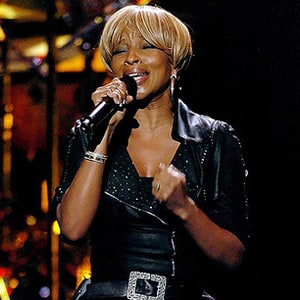
Born January 11th, 1971
Key Tracks "Real Love," "Not Gon' Cry," "No More Drama"
Influenced Beyoncé, Keyshia Cole
Key Tracks "Real Love," "Not Gon' Cry," "No More Drama"
Influenced Beyoncé, Keyshia Cole
"I can do a record with Elton John, I can do 'One' with Bono, I can work with Method Man, Jay-Z, and no one says, 'Why is she doing that?' " says Mary J. Blige. "And that's because I know exactly who I am and what I want." Blige's 1992 pairing with rookie Sean "Puffy" Combs for What's the 411? defined a new era for R&B, matching new-jack attitude with old-school emotion and songcraft. "She's the true heir to Aretha Franklin," duet partner Sting once said. Sixteen years later, Blige's exposed-nerve vocals keep getting more precise and more powerful. "I'm vocally the strongest I've ever been," says Blige. "I did the work, and now I can do whatever I want to do."
14. Steven Tyler
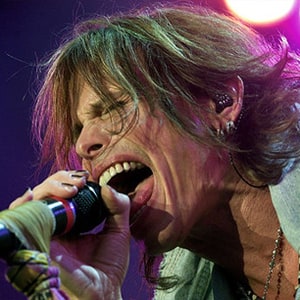
Born March 26th, 1948
Key Tracks "Sweet Emotion," "Dream On," "Walk This Way"
Influenced David Lee Roth, Axl Rose, Scott Weiland
Key Tracks "Sweet Emotion," "Dream On," "Walk This Way"
Influenced David Lee Roth, Axl Rose, Scott Weiland
Steven Tyler has a theory about how singing first began. "It had to be with the first primate uttering a moan during sex," he says. "I truly believe that's where the passion of voice comes from." Every line Tyler sings is informed by a leer and a wink, whether overtly ("Love in an Elevator") or with more subtlety ("Walk This Way"). In the course of nearly four decades fronting Aerosmith, Tyler has defined both the sound and style of the lead singer in a hard-rock band. "It's hard to separate the singer from the person," says Aerosmith guitarist Joe Perry. "You need personality to be a frontman." Tyler has that in spades, along with — amid all the yelps, groans, growls and squeals — an unerring sense of pitch. "As Tony Bennett said, 'Without heart, this is no art,' " Tyler says. "I wear my heart on my sleeve."
13. Stevie Nicks
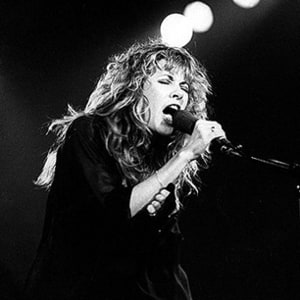
Born May 26th, 1948
Key Tracks "Landslide," "Dreams" (Fleetwood Mac) "Stand Back" (solo)
Influenced Natalie Maines, Sarah McLachlan, Courtney Love
Key Tracks "Landslide," "Dreams" (Fleetwood Mac) "Stand Back" (solo)
Influenced Natalie Maines, Sarah McLachlan, Courtney Love
Sheryl Crow calls Stevie Nicks' voice a "combination of sheer vulnerability and power," and Courtney Love swoons over "that ridiculous beautiful tone." Nicks' strong, deceptively versatile voice — by turns husky, warm, velvety and childlike — has provided the color and texture for songs ranging from smooth and mysterious Fleetwood Mac hits such as "Rhiannon" and "Dreams" to solo rockers like "Stand Back." "She's so tiny, and this big, deep voice comes rattling out, and I think that's very sexy," said Debbie Harry of Blondie. Nicks has influenced and mentored a wide generation of younger female singers, from the country of the Dixie Chicks to the sweet pop of Vanessa Carlton. "Her voice soothes me," says Love, "gives me something to aspire to and leaves me feeling courageous."
12. Joe Cocker
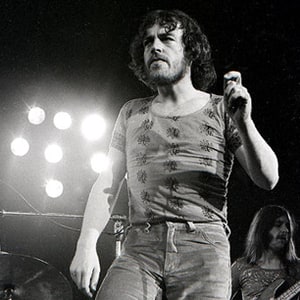
Born May 20th, 1944
Key Tracks "With a Little Help From My Friends," "You Are So Beautiful," "Feelin' Alright," "Cry Me a River"
Influenced Bryan Adams, Brian Johnson
Key Tracks "With a Little Help From My Friends," "You Are So Beautiful," "Feelin' Alright," "Cry Me a River"
Influenced Bryan Adams, Brian Johnson
"He brought Ray Charles to the mix as an influence on rock & roll," says Steve Van Zandt. Joe Cocker's voice is an irresistible force that combines a love of American soul music with an undeniable depth of feeling: The Northern English belter supercharged Charles' raw-throated vocals with rock & roll attitude, most famously on his hit cover of the Boxtops' "The Letter" and his monumental Woodstock performance of the Beatles' "With a Little Help From My Friends." The response to that helped push along a wave of blue-eyed-soul acts, including Leon Russell, and Delaney and Bonnie. Cocker would go on to interpret tunes by Randy Newman and Traffic as if they were R&B classics. And once he was done with them, that's what they were.
11. Prince
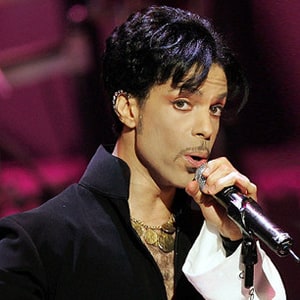
Born June 7th, 1958
Key Tracks Little Red Corvette," "When Doves Cry," "Kiss"
Influenced OutKast, D'Angelo, Gwen Stefani, Kevin Barnes
Key Tracks Little Red Corvette," "When Doves Cry," "Kiss"
Influenced OutKast, D'Angelo, Gwen Stefani, Kevin Barnes
"Prince is the boldest black singer in postmodern music, hands down," says Roots drummer Ahmir "?uestlove" Thompson. "His voice has multiple personalities, he's fearless, and when he screams, he truly sounds like he's crazy." Indeed, that throat-shredding climax to "The Beautiful Ones" sure feels like a man who has lost his mind — it's as convincing as the passion dripping from the lighter-than-air falsetto in "Adore," the pure-rock shouting of "Let's Go Crazy" or the robotic deadpan of "When Doves Cry." "His vocals are just limitless," says Lenny Kravitz. "There's the androgynous, very feminine Prince, there's the James Brown-style Prince, the gospel Prince, the rock & roll Prince. He has so many different textures and dimensions with his voice — and everything is funky."
10. Michael Jackson
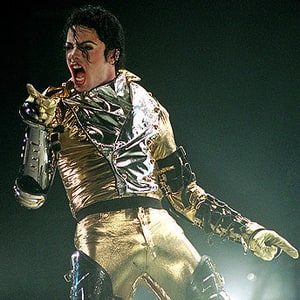
Born August 29th, 1958
Key Tracks "I Want You Back" (the Jackson 5), "Billie Jean," "Man in the Mirror" (solo)
Influenced Justin Timberlake, Chris Brown, Usher
Key Tracks "I Want You Back" (the Jackson 5), "Billie Jean," "Man in the Mirror" (solo)
Influenced Justin Timberlake, Chris Brown, Usher
Michael Jackson is a perfect storm of innate talent and training. His singing as a child is astounding: He just nailed "I Want You Back" — there's maybe one bum note on that song, which is crazy to me, because he was only 11 years old.
One of the key elements of his style is how he uses his voice as an instrument. His signature grunts — "ugh," "ah" and all that — are rhythmic things that guitar players or drummers usually do. He's one of the most rhythmic singers ever — Prince emulated James Brown a lot more, but Michael Jackson approximated it more naturally.
And he has insane range. I can sing pretty high, but I had to drop "Beat It" a half step when I sang it. He sings this incredibly high note — I think it's a high C or even a high C-sharp, which no one can hit — on "Beat It," as well as "Billie Jean" and "Thriller." What people don't realize is that he can go pretty deep too. You hear that on "Burn This Disco Out," on Off the Wall — he goes deep into his range, which blows me away.
When somebody gets as big as he did, you lose sight of how avant-garde and revolutionary they are, but Michael Jackson pushed the boundaries of pop and R&B. Think about it: On "Beat It," you had an R&B singer doing a full-on rock song with Eddie Van Halen. Or the intro on "Man in the Mirror": He's got this reverb in his voice, and any time he goes "uh!" it goes for miles. To me, that's up there with some Brian Eno shit. That's how far out there it is.
9. Otis Redding
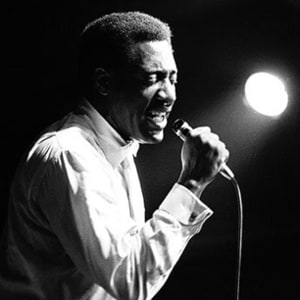
Born September 9th, 1941 (died December 10th, 1967)
Key Tracks "(Sittin' on) The Dock of the Bay," "These Arms of Mine," "Try a Little Tenderness"
Influenced Al Green, Toots Hibbert, Chris Robinson
Key Tracks "(Sittin' on) The Dock of the Bay," "These Arms of Mine," "Try a Little Tenderness"
Influenced Al Green, Toots Hibbert, Chris Robinson
The first time i saw Otis, i had no idea who he was. It was on the sidewalk at 926 East McLemore Avenue in Memphis, which was Stax Rec-ords. This guy was unloading equipment and suitcases from a station wagon, taking it into the studio. He was a driver for the singer Johnny Jenkins. I didn't see him much the rest of the day until later, when he asked for his audition. He sang "These Arms of Mine." It was in B-flat.
It didn't seem like an audition at all. It was a performance. It wasn't the size of his voice — we knew lots of people with vocal powers like that. It was the intent with which he sang. He was all emotion. It was like, "This guy is definitely not singing for the money." I don't think he ever did.
Range was not a factor in his singing. His range was somewhat limited. He had no really low notes and no really high notes. But Otis would do anything that implied emotion, and that's where his physicality came in, because he was such a strong, powerful man. Backstage, he would be like a prizefighter waiting to get out there. Playing "Respect" live with him was just energy and relentless joy.
Without singing, Otis was more distracted, not sure of himself. He couldn't make the same movements in the studio when he sang. He was more restricted. You got the impression, though. He would do that thing where he stomped the left foot, then the right. And we all played with more intensity around him. He had that magnetism — "I'm a man!" — and he knew it, too. "These Arms of Mine" is still Otis' signature song for me. It is so simple in its beauty and message. Here is a young man singing to a girl: "If you would even consider being with me, how happy I would be." That's such a basic emotion. That's how he sang it, and that's what got him over.
8. Bob Dylan
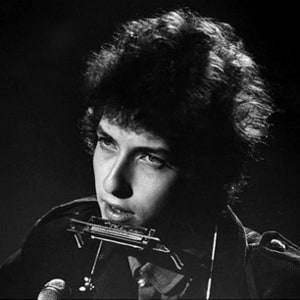
Born May 24th, 1941
Key Tracks "Like a Rolling Stone," "Lay Lady Lay," "Visions of Johanna"
Influenced John Lennon, Bruce Springsteen, Patti Smith, Conor Oberst
Key Tracks "Like a Rolling Stone," "Lay Lady Lay," "Visions of Johanna"
Influenced John Lennon, Bruce Springsteen, Patti Smith, Conor Oberst
Bob Dylan did what very, very few singers ever do. He changed popular singing. And we have been living in a world shaped by Dylan's singing ever since. Almost no one sings like Elvis Presley anymore. Hundreds try to sing like Dylan. When Sam Cooke played Dylan for the young Bobby Womack, Womack said he didn't understand it. Cooke explained that from now on, it's not going to be about how pretty the voice is. It's going to be about believing that the voice is telling the truth.
To understand Bob Dylan's impact as a singer, you have to imagine a world without Tom Waits, Bruce Springsteen, Eddie Vedder, Kurt Cobain, Lucinda Williams or any other vocalist with a cracked voice, dirt-bowl yelp or bluesy street howl. It is a vast list, but so were the influences on Dylan, from the Talmudic chanting of Allen Ginsberg in "Howl" to the deadpan Woody Guthrie and Lefty Frizzell's murmur. There is certainly iron ore in there, and the bitter cold of Hibbing, Minnesota, blowing through that voice. It's like a knotted fist, and it allows Dylan to sing the most melancholy tunes and not succumb to sentimentality. What's interesting is that later, as he gets older, the fist opens up, to a vulnerability. I have heard him sing versions of "Idiot Wind" where he was definitely the idiot.
I first heard Bob Dylan's voice in the dark, when I was 13 years old, on my friend's record player. It was his greatest-hits album, the first one. The voice was at once modern, in all the things it was railing against, and very ancient. It felt strangely familiar to an Irishman. We thought America was full of superheroes, but it was a much humbler people in these songs — farmers, people who have had great injustices done to them. The really unusual thing about Bob Dylan was that, for a moment in the Sixties, he felt like the future. He was the Voice of a Generation, raised against the generation that came before. Then he became the voice of all the generations, the voices in the ground — these ghosts from the Thirties and the Dust Bowl, the romance of Gershwin and the music hall. For me, the pictures of him in his polka-dot shirt, the Afro and pointy shoes — that was a brief flash of lightning. His voice is usually put to the service of more ancient characters.
Here are some of the adjectives I have found myself using to describe that voice: howling, seducing, raging, indignant, jeering, imploring, begging, hectoring, confessing, keening, wailing, soothing, conversational, crooning. It is a voice like smoke, from cigar to incense, where it's full of wonder and worship. There is a voice for every Dylan you can meet, and the reason I'm never bored of Bob Dylan is because there are so many of them, all centered on the idea of pilgrimage. People forget that Bob Dylan had to warm up for Dr. King before he made his great "I have a dream" speech — the preacher preceded by the pilgrim. Dylan has tried out so many personas in his singing because it is the way he inhabits his subject matter. His closet won't close for all the shoes of the characters that walk through his stories.
I love that album Shot of Love. There's no production. You're in a room hearing him sing. And I like a lot of the songs that he worked on with Daniel Lanois — "Series of Dreams," "Most of the Time," "Dignity." That is the period where he moves me most. The voice becomes the words. There is no performing, just life — as Yeats says, when the dancer becomes the dance.
Dylan did with singing what Brando did with acting. He busted through the artifice to get to the art. Both of them tore down the prissy rules laid down by the schoolmarms of their craft, broke through the fourth wall, got in the audience's face and said, "I dare you to think I'm kidding."
7. Stevie Wonder
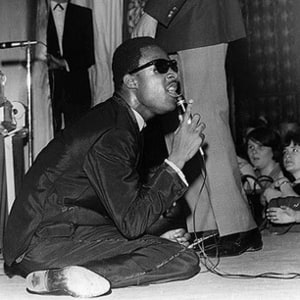
Born May 13th, 1950
Key Tracks "Superstition," "Sir Duke," "Signed, Sealed, Delivered I'm Yours"
Influenced Donny Hathaway, Maxwell, Adam Levine
Key Tracks "Superstition," "Sir Duke," "Signed, Sealed, Delivered I'm Yours"
Influenced Donny Hathaway, Maxwell, Adam Levine
To me, Stevie Wonder's voice always sounds like tears of joy — like he's right on the verge of crying, but it's out of glee and peace, as opposed to the pain of someone like a Sly Stone.
There's a richness to his voice, a clarity to all of its inflections. That vibrato is so impactful and piercing, but he never loses that underlying straightforward singing voice. His lack of sight must heighten his other senses, his ability to imagine and feel. It makes his music very visual, very graphic.
The first time I remember hearing Stevie Wonder was when I heard him singing "Fingertips," in the movie Cooley High. I was in awe of this child's ability to see himself so clearly and be so sure of himself so young. Then I had to go back and discover Stevie Wonder as a whole. My uncle had an album collection, so I had seen Talking Book and Innervisions, but I knew the covers before I knew the music. I got turned on to his amazing performances like "Superwoman," "I Ain't Gonna Stand for It" and, of course, "Ribbon in the Sky" — that song is so simple, but it's so significant. His voice has so much variation and such diversity.
His confidence and his sense of self are just supernatural. Stevie Wonder knows exactly who he is, what role and responsibility he's been given. But he revels in being chosen, singled out, and that's what makes him who he is. He's like a miracle.
6. Marvin Gaye
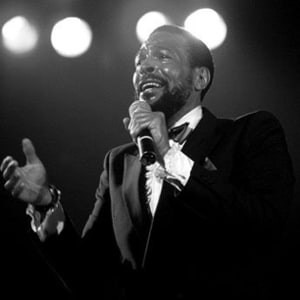
Born April 2nd, 1939 (died April 1st, 1984)
Key Tracks "What's Going On," "Let's Get It On," "I Heard It Through the Grapevine"
Influenced D'Angelo, R. Kelly, Usher
Key Tracks "What's Going On," "Let's Get It On," "I Heard It Through the Grapevine"
Influenced D'Angelo, R. Kelly, Usher
There's no sound like Marvin Gaye: the way he sang so softly, almost gently — but also with so much power. That came straight from the heart. Everything in his life — everything that he thought and felt — affected his singing.
The first time I was really introduced to Marvin Gaye was the What's Going On album, and I fell in love. It was so moving to hear him talk so desperately about the state of the world, on top of all that brilliant musicality. One of my favorite things he did was to follow the strings with his voice, or double things that the instruments are doing. There's such a simple, subtle lushness to it that adds this whole other layer to the music.
These days we have Pro Tools and a thousand tracks, and you can do different vocals on every track. But back then you really had to innovate, like the way Marvin answered himself in songs, or all that really distant backing work, where his voice is all the way in the back and echoing. It's haunting; he delivered every single song with such clarity that it gave me chills.
The live version of "Distant Lover" has to be one of the most incredible performances ever captured on tape. You can feel his confidence, his yearning — you can imagine his movements. The entire audience is hanging on his every word; he's teasing them the whole time. That's what makes Marvin Gaye immortal: the emotion that he evokes. What's Going On changed my whole world — my life, my songwriting style, everything.
5. John Lennon
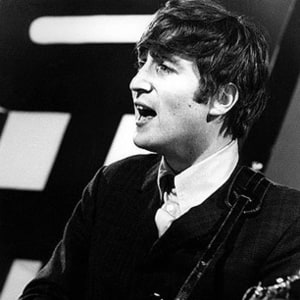
Born October 9th, 1940 (died December 8th, 1980)
Key Tracks "I Feel Fine," "Strawberry Fields Forever," "Imagine," "Instant Karma"
Influenced Bono, Neil Young, Liam Gallagher
Key Tracks "I Feel Fine," "Strawberry Fields Forever," "Imagine," "Instant Karma"
Influenced Bono, Neil Young, Liam Gallagher
There was a tremendous intimacy in everything John Lennon did, combined with a formidable intellect. That is what makes him a great singer. In "Girl," on Rubber Soul, he starts in this steely, high voice: "Is there anybody going to listen to my story. . . ." It's so impassioned, like somebody stepping from the shadows in a room. But when he comes to the chorus, you suddenly realize: He's talking directly to her. When I heard this, as a young teenager, it hit the nail on the head. It embodied the feelings I was living with every day — completely burning with sexual desire, with almost a regret at being so overpowered.
He had a confidence, a certainty about what he was feeling that carried over into everything he sang. One of the things about John Lennon and the Beatles that went by a lot of people was how unusual it was for people in their class, from Liverpool, to be catapulted into the higher reaches of entertainment and society, without disguising their working-class roots and voices. It was such an audacious thing to do, not to change who they were. That was the heart of John Lennon's singing — to say who he was and where he was from.He didn't sing very loud. I got that sense when I was learning "Oh My Love," on Imagine. That song has to be done quietly, which turns out to be a feat of strength. It's ironic — to sing high and quiet, you have to be physically strong. In "I'm Only Sleeping," on Revolver, he sounds sleepy, like he's half in bed as he sings. Or "I'm So Tired," on the White Album — there is an irritableness to it. These songs live in you because of the remarkable facility of the singer to inhabit those moments and portray them. "Imagine" is a masterful performance. He inhabits that idea — our innermost longing for a world in which peace is real — when he sings it. And it is sung with fearlessness, without erring on either side — polemic or sappy. It's wonderful to have an idea expressed so well that everybody can sing it. That's a song he made you want to sing.
The more he developed as a writer, he was able to show his voice in various contexts. There is a thrilling aloneness in the way he sings "A Day in the Life." His singing on John Lennon/Plastic Ono Band is to the bone. He willed himself to express his pain: "Mother/You had me/But I never had you." It's a crushing depiction that stays with you forever. Double Fantasy is less tortured — there is a lot of happiness there. The singing is just beautiful, perhaps more the product of singing at home, to his son. John Lennon went through a lot to have the life he had. He gave up some things to get others. And he died before a lot of those themes could be examined.
But it was a stunning thing — he always told the truth. He felt he had the right to talk about this stuff, and that gives his voice a singular identity. It's not the chops of a heralded singer — no one goes on about his actual technique. He went right to what he felt, what he had to say.
But it was a stunning thing — he always told the truth. He felt he had the right to talk about this stuff, and that gives his voice a singular identity. It's not the chops of a heralded singer — no one goes on about his actual technique. He went right to what he felt, what he had to say.
4. Sam Cooke
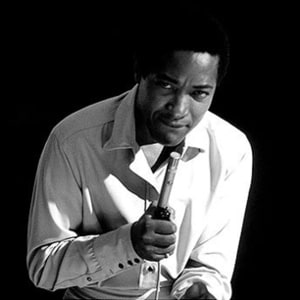
Born January 22nd, 1931 (died December 11th, 1964)
Key Tracks "A Change Is Gonna Come," "Bring It on Home to Me," "You Send Me"
Influenced Otis Redding, Art Garfunkel, Rod Stewart
Key Tracks "A Change Is Gonna Come," "Bring It on Home to Me," "You Send Me"
Influenced Otis Redding, Art Garfunkel, Rod Stewart
If a singer is not singing from the soul, I do not even want to listen to it — it's not for me.
Sam Cooke reached down deep with pure soul. He had the rare ability to do gospel the way it's supposed to be — he made it real, clean, direct. Gospel drove Sam Cooke through his greatest songs, the same way it did for Ray Charles, who came first, and Otis Redding.
He had an incomparable voice. Sam Cooke could sing anything and make it work. But when you're talking about his strength as a singer, range is not relevant. It was his power to deliver — it was about his phrasing, the totality of his singing.
He did a lot of great songs, but "Bring It on Home to Me" is a favorite. It's just a well-crafted song with a great lyric and melody. It's a song that's written to allow you to go wherever you can with it. "A Change Is Gonna Come" is another song I covered; it's a great arrangement.
Not many people can play this music anymore, not the way Sam Cooke did it, coming directly from the church. What can we learn from a singer like him, from listening to songs like "A Change Is Gonna Come"? It depends on who the singer is and what they are capable of, where their head is and how serious they are. But Sam Cooke was born to sing.
3. Elvis Presley
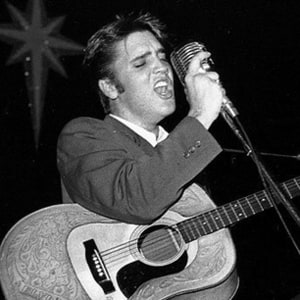
Born January 8th, 1935 (died August 16th, 1977)
Key Tracks "Mystery Train," "Hound Dog," "Suspicious Minds"
Influenced Bono, Bruce Springsteen
Key Tracks "Mystery Train," "Hound Dog," "Suspicious Minds"
Influenced Bono, Bruce Springsteen
There is a difference between people who sing and those who take that voice to another, otherworldly place, who create a euphoria within themselves. It's transfiguration. I know about that. And having met Elvis, I know he was a transformer.
The first Elvis song I heard was "Hound Dog." I wasn't equipped with any of the knowledge I have now, about the Big Mama Thornton version or where all that swing was coming from. I just heard this voice, and it was absolutely, totally in its own place. The voice was confident, insinuating and taking no prisoners. He had those great whoops and diving moments, those sustains that swoop down to the note like a bird of prey. I took all that in. You can hear that all over Led Zeppelin.
When I met Elvis with Zeppelin, after one of his concerts in the early Seventies, I sized him up. He wasn't quite as tall as me. But he had a singer's build. He had a good chest — that resonator. And he was driven. "Anyway You Want Me" is one of the most moving vocal performances I've ever heard. There is no touching "Jailhouse Rock" and the stuff recorded at the King Creole sessions. I can study the Sun sessions as a middle-aged guy looking back at a bloke's career and go, "Wow, what a great way to start." But I liked the modernity of the RCA stuff. "I Need Your Love Tonight" and "A Big Hunk o' Love" were so powerful — those sessions sounded like the greatest place to be on the planet.
At that meeting, Jimmy Page joked with Elvis that we never soundchecked — but if we did, all I wanted to do was sing Elvis songs. Elvis thought that was funny and asked me, "Which songs do you sing?" I told him I liked the ones with all the moods, like that great country song "Love Me" — "Treat me like a fool/Treat me mean and cruel/But love me." So when we were leaving, after a most illuminating and funny 90 minutes with the guy, I was walking down the corridor. He swung 'round the door frame, looking quite pleased with himself, and started singing that song: "Treat me like a fool. . . ." I turned around and did Elvis right back at him. We stood there, singing to each other.
By then, because of the forces around him, it was difficult for him to stretch out with more contemporary songwriters. When he died, he was 42. I'm 18 years older than that now. But he didn't have many fresh liaisons to draw on — his old pals weren't going to bring him the new gospel. I know he wanted to express more. But what he did was he made it possible for me, as a singer, to become otherworldly.
2. Ray Charles
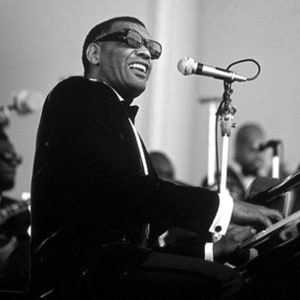
Born September 23rd, 1930 (died June 10th, 2004)
Key Tracks "What'd I Say, Pts. 1 & 2," "I Got a Woman," "You Don't Know Me," "Georgia on My Mind"
Influenced Van Morrison, Otis Redding, Stevie Wonder
Key Tracks "What'd I Say, Pts. 1 & 2," "I Got a Woman," "You Don't Know Me," "Georgia on My Mind"
Influenced Van Morrison, Otis Redding, Stevie Wonder
Ray Charles had the most unique voice in popular music. He would do these improvisational things, a little laugh or a "Huh-hey!" It was as if something struck him as he was singing and he just had to react to it. He was getting a kick out of what he was doing. And his joy was infectious.
But there was something else I didn't realize until we sang together in the Eighties, on my song "Baby Grand." When he sings, he's not just singing soulfully. He is imparting his soul. You are hearing something deep within the man. I thought it would just turn me into this little nerd from Levittown, New York. But it didn't. It emboldened me. It was like an evangelical event. He was the minister and I was the congregation. I got all fired up.
Ray started out wanting to be Nat "King" Cole. When Nat went down low in a song, like "Mona Lisa," there was a growl in there that was kind of sexy. Ray took that to a whole other level. He took the growl and turned it into singing. He took the yelp, the whoop, the grunt, the groan, and made them music.
Also, he was a piano player. The piano is a percussion instrument. You put your body into it. Ray had a lot of unique body movements I didn't know until I saw him. Before I saw him, I heard those movements as he sang. I heard his shoulder go up a little on the left side, the way he lifted himself off the stool. Then I realized the voice I was hearing was also playing that piano.
The first Ray Charles I heard was Modern Sounds in Country and Western Music. He'd had hits before that, the R&B stuff, like "What'd I Say." But here is a black man giving you the whitest possible music in the blackest possible way, while all hell is breaking loose with the civil rights movement. When he sang "You Don't Know Me," I thought, "He isn't just singing the lyrics. He's saying, 'You don't know me. Get to know me.' "
He could be very sly with a song. His 1972 version of "America the Beautiful" is an iconic recording. There was so much feeling in his performance. It was his way of saying, "This is my country too. We gave you your popular music. This was ours before it was yours."
But Ray synthesized the blues into a language everybody could relate to. You can't listen to Ray Charles and not say, "This is a man who felt deeply, who has lived this music." He shows you his humanity. The spontaneity is evident. Another guy might say, "That was a mistake, we can't leave that in." No, Ray left it in. The mistake became the hook.
1. Aretha Franklin
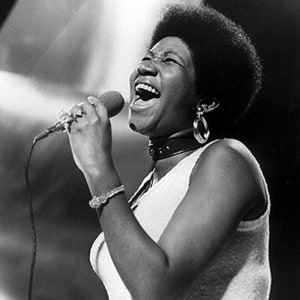
Born March 25th, 1942
Key Tracks "(You Make Me Feel Like) A Natural Woman," "Respect," "I Never Loved a Man (The Way I Love You)," "Think," "Chain of Fools"
Influenced Whitney Houston, Alicia Keys, Aaron Neville, Annie Lennox
Key Tracks "(You Make Me Feel Like) A Natural Woman," "Respect," "I Never Loved a Man (The Way I Love You)," "Think," "Chain of Fools"
Influenced Whitney Houston, Alicia Keys, Aaron Neville, Annie Lennox
You know a force from heaven. You know something that God made. And Aretha is a gift from God. When it comes to expressing yourself through song, there is no one who can touch her. She is the reason why women want to sing.
Aretha has everything — the power, the technique. She is honest with everything she says. Everything she's thinking or dealing with is all in the music, from "Chain of Fools" to "Respect" to her live performances. And she has total confidence; she does not waver at all. I think her gospel base brings that confidence, because in gospel they do not play around — they're all about chops, who has the vocal runs. This is no game to her.
As a child, I used to listen to Aretha's music because my mom played "Do Right Woman" and "Ain't No Way" every single day. I would see my mother cry when she listened to those songs, and I'd cry too. Then I discovered her on my own with the Sparkle soundtrack. I must have played "Giving Him Something He Can Feel" 30 times in a row; eventually, I connected the dots to that voice my mom was listening to.
Even the way she pronounces words is amazing: In "Giving Him Something He Can Feel," when she sings, "Many say that I'm too young" — the way she says "I'm," you can almost see her saying it, like she's all in your face, but you're still right with her. You can really visualize her hands when she sings, "You're tying both of my hands," on "Ain't No Way" — it's the powerful way she hits the word "both."
When you watch her work, you can see why Aretha is who she is. When we did the song "Don't Waste Your Time" on my album Mary, she just went in there and ate that record like Pac-Man. She could be doing a church vocal run, and it would turn into some jazz-space thing, something I never encountered before. You'd say, "Where did that come from? Where did she find that note?"
It's beautiful to see, because it helps people with a lack of confidence in their ability, like myself. I look at her and think, "I need a piece of that. Whatever that is."


Comments
Post a Comment